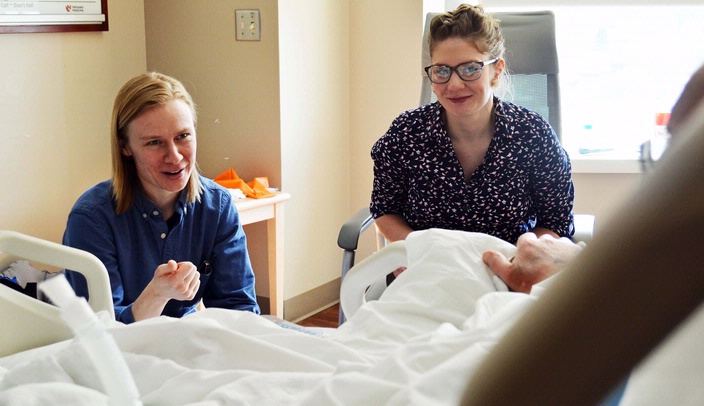How does one learn bedside manner? To connect with patients on a personal level? To see them as more than their conditions or diagnoses?
How does a health care provider remember his or her own humanity, in the midst of an especially high-stress day? Week? Career?
UNMC’s chapter of the Gold Humanism Honor Society — an honor society that partners with medical schools and teaching hospitals to infuse humanism into medical training — took a few steps toward answering these questions during its recent “Tell Me More” campaign.
UNMC GHHS members and their accompanying fellow medical students visited with patients throughout Nebraska Medicine’s main-campus hospital as part of GHHS Solidarity Week for Compassionate Patient Care, Feb. 13-17. Across the country, at some 90 participating chapters and institutions, students came not as medical providers, but as social visitors, asking the patients about themselves.
Patients were asked:
- What do you do for fun?
- What is your favorite place you have ever been?
- Which skill/talent gives you the greatest sense of pride?
- What piece of advice have you lived your life by?
One elderly woman said, “I like to crochet . . . and ride motorcycles,” GHHS member and medical student Kemper Schumacher recalled.
Connecting with patients on a human level also is a win for the med students and providers, said UNMC GHHS president Mary Wulff.
“It helps us remember why we got into medicine in the first place,” she said.
The patients’ answers to the question “What is the best advice you’ve ever received?” will be compiled to inspire UNMC’s medical students.
But bedside manner isn’t always easy. Many patients lit up at the thought of a social visit. Others – they are in the hospital, after all – were understandably exhausted, discouraged, hurting or confused about yet another group of people coming into their rooms. Some visits were heartwarming. Others, a little awkward.
“There is a learning curve for all of us to just sit there with somebody, and to meet them where they are,” Schumacher said.
“It’s definitely a skill I still have to learn,” added Miranda Thompson, a fellow medical student.
And so they marched into the next room, to meet the next patient, striving to connect.
These efforts were part of a special week. But GHHS, and UNMC’s medical students, may just keep it going. “The more patient contact, the better,” Wulff said.
“This just reinforces the culture of UNMC as a place for compassionate care.”

Kudos to all the Gold scholars. Hearts and brains in the right places.
GREAT WORK MEDICAL STUDNETS & THANKS TO CHARITY EVANS FOR BRINGING THE GOLD SOCIETY TO UNMC.
This is so important when you are a patient. You want to be seen as a person. Nice to see this being a focus.